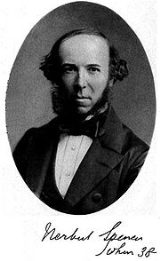
philosopher, biologist
, sociologist, and prominent classical liberal
political theorist of the Victorian era
.
Spencer developed an all-embracing conception of evolution
as the progressive development of the physical world, biological organisms, the human mind, and human culture and societies. He was "an enthusiastic exponent of evolution" and even "wrote about evolution before Darwin
did." As a polymath
, he contributed to a wide range of subjects, including ethics
, religion, anthropology, economics, political theory, philosophy, biology, sociology, and psychology.
All evil results from the non-adaptation of constitution to conditions. This is true of everything that lives. Does a shrub dwindle in poor soil, or become sickly when deprived of light, or die outright if removed to a cold climate? it is because the harmony between its organization and its circumstances has been destroyed.![]()
Evil perpetually tends to disappear.![]()
Every man may claim the fullest liberty to exercise his faculties compatible with the possession of like liberties by every other man.![]()
Limiting the liberty of each by the like liberty of all, excludes a wide range of improper actions, but does not exclude certain other improper ones.![]()
Equity knows no difference of sex. In its vocabulary the word man must be understood in a generic, and not in a specific sense.![]()
A clever theft was praiseworthy amongst the Spartans; and it is equally so amongst Christians, provided it be on a sufficiently large scale.![]()
Education has for its object the formation of character. To curb restive propensities, to awaken dormant sentiments, to strengthen the perceptions, and cultivate the tastes, to encourage this feeling and repress that, so as finally to develop the child into a man of well proportioned and harmonious nature — this is alike the aim of parent and teacher.![]()

